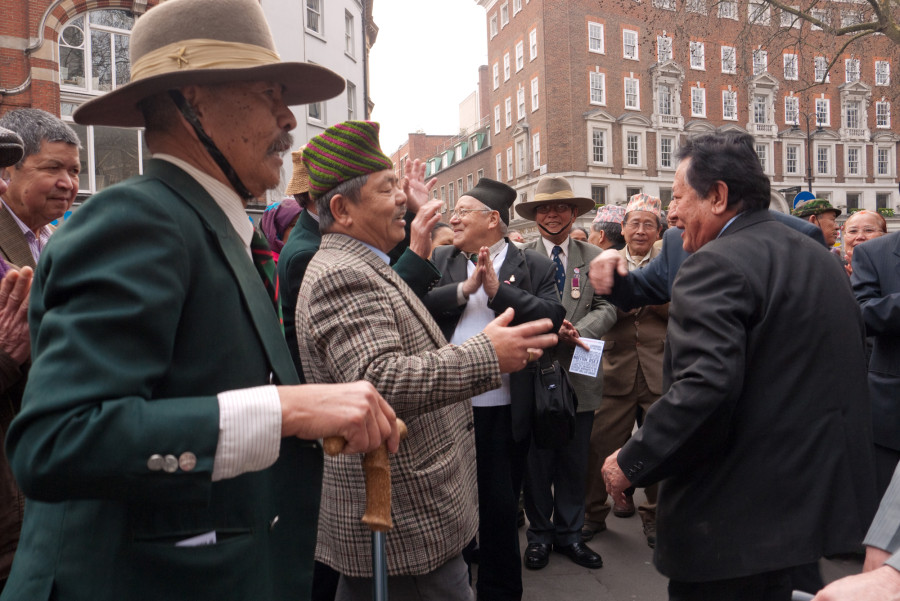Opinion
Guardians of the empire
The British Gurkha connection is one of the enduring strands in the close bond of friendship between Nepal and the UK.
PB Shah
Although the commencement of relations between Nepal and the UK can be traced back to 1792 when they signed a trade and commerce treaty, formal diplomatic relations were established in 1816. In 1923, the two countries signed a new Treaty of Friendship. The UK is the first country to open a resident mission in Nepal, and it is also the first country ever visited by a Nepali prime minister, in 1850. The year 2016 marked the culmination of 200 years of friendship.
The UK has remained one of Nepal's important development partners since the 1950s. Currently, the UK's development cooperation to Nepal stands at around 100 million pounds. The most notable British assistance in the field of education was the establishment of Budhanilkantha School and Nepal Administrative Staff College which was initially administered by British teachers. Britain continues to provide fellowships to civil servants, teachers and the Nepal Army to impart higher studies in the UK. The UK is also among Nepal's top 10 trading partners. In 2017, about 40,000 British tourists visited Nepal for trekking, mountaineering and other leisure activities. The UK is one of the most preferred destinations for Nepali students to pursue higher studies.
Gurkha connection
The British Gurkha connection remains one of the unique and enduring strands in the close bond of friendship between Nepal and the UK. The British Gurkhas have served the British Crown for more than two centuries, and some 260,000 of them fought in World War II. The number of British Gurkhas has now shrunk to 3,200 active servicemen, some 30,000 pension holders, 10,000 welfare recipients and about 1,200 non-pension holders. The UK pays approximately 60 million pounds to Gurkhas and 100 million pounds to Nepalis living in the UK.
The British Gurkhas have some dissatisfaction over the unequal facilities provided to them compared to their British counterparts. Many of the grievances including ‘unequal and not fair treatment’ raised by British Gurkha veterans have been addressed as per the provisions of Annexure III of the 1947 Tripartite Agreement signed between Nepal, India and the UK which enumerates Nepal’s suggestions to the British government relating to the employment of Gurkhas.
The government of Nepal has been making representations to the British government at various levels to make the benefits and pensions provided to Gurkha soldiers equitable and just in view of their outstanding contributions. Nepal's foreign secretary discussed the outstanding issue of Gurkha veterans on the sidelines of the fourth meeting of the Bilateral Consultation Mechanism between Nepal and the UK held in London in November 2018 where the British Minister of State for the Armed Forces stressed the need for an early resolution of their grievances.
A campaign by British actress Joanna Lumley, whose father was affiliated with the Gurkha regiment, resulted in Gurkha veterans who have served and lived in the UK for more than four years being granted the right to UK citizenship. For the first time, in the more than 200-year history of Gurkhas in the British Army, a new policy has been introduced to induct Nepali women for the first time to join the elite regiment. The remittance sent back by Gurkhas serving in the UK, Brunei and Singapore is counted as a significant contribution to Nepal's economy and a big help to raising the standard of living of the Nepali people.
Brexit and Nepal
Britain’s exit from the European Union will have a long-term impact on trade, foreign direct investment, security and migration with the bloc with its ramifications on many other countries as well. As far as the impact of Brexit on Nepal is concerned, many say that there will be little direct effect. However, there are more than 100,000 Nepali Gurkha families and other Nepalis living there in addition to numerous Nepali students pursuing higher studies; the remittance they send home amounts to a sizeable sum. Additionally, the UK is one of Nepal's important development partners and among the top 10 trading partners, and about 40,000 British tourists visit Nepal annually. Therefore, there will definitely be a penetrating impact on Nepal and the Nepali economy from Brexit.
The possible volatility in the currency strength of the British pound and the euro after their divorce deal may also have a substantial impact on the economic cooperation received by Nepal from the UK and the European Union, both bilaterally and multilaterally. Nepal needs to renegotiate not only issues related to economic cooperation but also a number of agreements with the UK before Brexit including trade and commerce and civil aviation, among others. There have already been notable impacts such as the challenges facing Europe, low growth, euro-zone governance, migration, debt, border security and populism.
Shah is a former Nepali ambassador to Brazil.




 9.7°C Kathmandu
9.7°C Kathmandu










